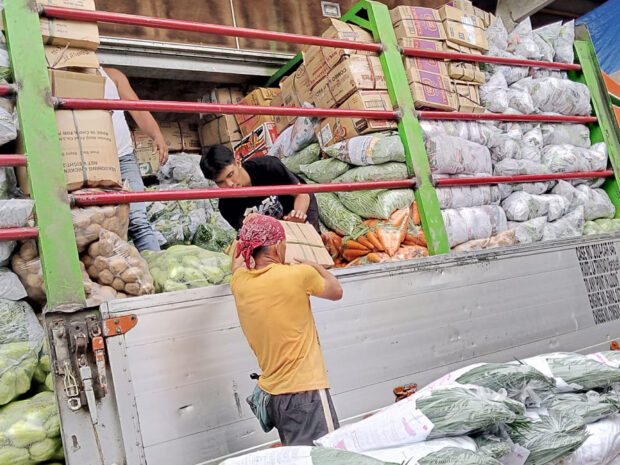
FARM TO MARKET | In this photo taken in April 2023, workers at the vegetable trading post in La Trinidad, Benguet, keep up with the arrival of delivery trucks unloading freshly harvested vegetables from farms in the province and other areas in the Cordillera region. (File photo by ALLAN MACATUNO / Inquirer Northern Luzon)
BAGUIO CITY—Vegetable farmers and traders have again appealed to the government to address the unabated smuggling of vegetables that continue to flood local markets as they blamed the illicit activity for the drop in the demand for local produce during the holiday season.
In an interview on Wednesday, Agot Balanoy, spokesperson for the League of Associations at the La Trinidad Vegetable Trading Areas Inc., said they were expecting that their sales for the Christmas and New Year holidays would pick up because “it’s supposed to be the peak season for the vegetable industry.”
She said only five of her group’s 28 vegetable delivery trucks had managed to double their trips during the Christmas and New Year holidays due to the low demand.
“But those who were able to double their trips had difficulty disposing of their load because their delivery was delayed by the heavy traffic in Metro Manila,” Balanoy said, noting that each truck carries 20 to 25 metric tons of assorted vegetables per trip.
Illegal entry
In a statement, the league said the illegal entry of vegetables, most of these coming from China, is “killing the vegetable and agricultural industry, the farmers and the other stakeholders whose livelihood is heavily anchored on agriculture.”
Balanoy said the Bureau of Customs (BOC) confiscated smuggled carrots and potatoes in Zambales province on Nov. 10. These vegetables, she said, were discovered in boxes that were passed off as coming from farms in Benguet province.
“But based on our monitoring, these smuggled vegetables that are actually from China are still being sold in local markets in Luzon until today,” Balanoy said.
Local traders said smuggled vegetables like carrots, celery, leeks and cauliflower could easily be distinguished because these no longer have stems and leaves when sold in local markets.
“As for potatoes and broccoli, these usually look the same as locally grown but are already packed in boxes or crates, and come in uniform sizes,” Balanoy said.
She said the wholesale prices of smuggled vegetables are lower by at least P10 per kilo.
“There are some illegally imported crops that are more expensive by P10 [per kilo] but buyers prefer the imported ones because of their longer shelf life [due to chemical fertilizers and preservatives],” Balanoy said.
Senate probe
Benguet and some parts of Mountain Province and Ifugao provinces supply 80 percent of Metro Manila’s daily salad vegetable demand.
Vegetable traders in Benguet alone deliver an average of 1.7 million kilos of assorted vegetables to different markets in Luzon and other parts of the country every day.
Over 58,000 families in Benguet, Ifugao and Mountain Province rely on vegetable farming as their main source of livelihood in 2020, according to the Philippine Statistics Authority.
According to Balanoy, her group has been urging the national government and concerned agencies to protect local produce from smuggled products, noting that the problem persists despite an investigation launched by the Senate last year.
During the committee-of-the-whole investigation into the unabated vegetable smuggling in the country last year, high-ranking government officials and politicians were tagged as big-time smugglers.
The investigation was made following a December 2021 privilege speech of then Senate President Vicente Sotto III, who named the alleged protectors of smugglers in the country.
During one of the hearings, Balanoy complained about the influx of smuggled vegetables, like carrots, even after the BOC and the Department of Agriculture reported that their teams, in a series of operations, had confiscated smuggled agricultural products from key ports in the country, including Subic in Zambales.
Balanoy told the committee that Benguet farmers managed to obtain evidence that smuggled carrots had flooded local markets at their expense.
‘Brazen’
She cited accounts that small warehouses near Divisoria market, a major trading hub for fresh vegetables in Manila, had been releasing imported vegetables to the local market whenever prices of Benguet vegetables shot up.
Benguet vegetable farmers were reportedly losing an average of P2.5 million a day due to declining orders from their customers by up to 40 percent, owing to the influx of smuggled vegetables.
In a recent interview, Balanoy expressed her “disappointment” over the government’s “inaction” despite the Senate investigation.
She then described smuggling of vegetables as “more brazen now than ever.” INQ